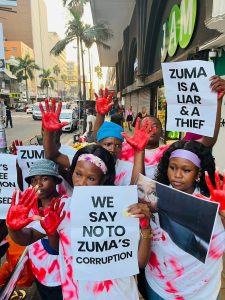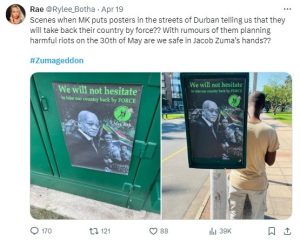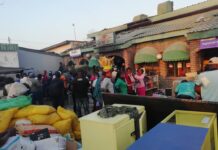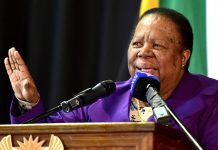
By Staff Reporter
Recently, the political atmosphere in South Africa has become very tense, mainly due to the actions and words of the MK party. Not long ago, the MK party released a video that was very aggressive and should have caught a lot of people’s attention because of its controversial content.
However, it didn’t make as much of a splash as expected. This could be because people are getting used to shocking statements in politics, or they might think the MK party can’t really do what it says it will.
People who criticize the MK party remember other times when its members, like Visvin Reddy, said things that could lead to violence. Reddy once talked about causing civil unrest to get more political power, which shows the party sometimes uses extreme language that could incite violence.
The situation became more serious with recent events in Durban. The MK party’s propaganda was everywhere in the city, with messages like “We will not hesitate to take our country back by force.”
This kind of aggressive message makes us rethink what the MK party and its leader, Jacob Zuma, are planning, especially with Durban’s political background in mind.

Moreover, the MK party has been handing out materials that not only encourage rallies but also teach people how to make Molotov cocktails and fight against police.
This is a big step up in how aggressive the party is being and suggests they might use similar tactics after the elections. These actions are worrying because they could lead to violence and upset the peace and order in society.

The recent distribution of instructional materials for creating Molotov cocktails marks a particularly alarming escalation in the party’s approach. This tactic is not just a theoretical call to arms; it is a practical guide to chaos, suggesting a dangerous shift from rhetoric to action.
Such steps not only pose a threat to public safety but also raise serious legal and ethical questions about the boundaries of political speech and action.
In response to these extreme views, a large group of people in Durban organized a peaceful protest near the MK party’s office. This colourful and peaceful protest was very different from the violent messages of the MK party.
It showed that most people reject violence and instability, preferring peace and democratic ways of dealing with issues instead of radical change.
The protest in Durban was significant, not just for its size but for its symbolism. Participants waved banners and sang songs advocating for peace and unity, starkly contrasting the violent undertones of the MK party’s recent messages.
This event highlighted the community’s resilience and determination to oppose any forms of political violence and to hold onto the core values of democracy.

Also, residents’ dissatisfaction has spilled over into social media. Users are posting the hashtag #zumageddon and actively expressing their civic stance.
Information about the upcoming protests from the MK party is eliciting emotional reactions among users, underscoring deep socio-political tensions in the country. This reaction indicates the overwhelmingly negative sentiment of South African residents towards Jacob Zuma’s MK party.

Looking at these events around the MK party helps us see the bigger picture of political extremism and public safety in South Africa. The reaction of the people in Durban shows a strong support for democratic values and living together in peace.
As things keep changing politically, it’s important for both leaders and citizens to work through these challenges by talking and coming together, avoiding the paths of division and destruction offered by groups like the MK party.
The unfolding scenario poses a critical question for the future of South Africa: Will the nation’s political discourse tilt towards aggressive, potentially violent rhetoric, or will it steer back to a more moderate and inclusive dialogue? The answer lies not only in the actions of political parties like MK but also in the everyday choices of its citizens to engage, speak out, and act against extremism in all its forms.












